There Is No 72-Hour Deadline For Iran Nuclear Talks - EU's Mora
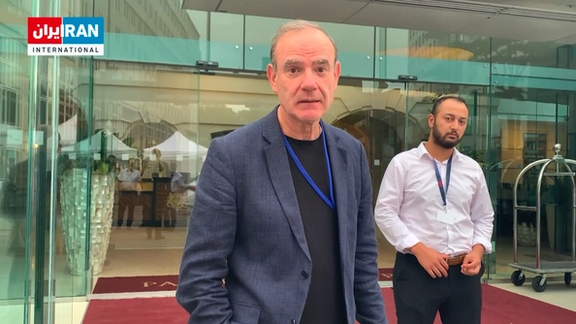
European Union’s coordinator in Iran nuclear talks Enrique Mora has rejected a report that said there is a "72-hour deadline" in the negotiations.

European Union’s coordinator in Iran nuclear talks Enrique Mora has rejected a report that said there is a "72-hour deadline" in the negotiations.
Speaking to reporters at the venue of the talks at hotel Coburg in the Austrian capital Vienna, Mora told Iran International’s correspondent that he also read about the deadline in a Bloomberg report, saying someone had said the deal would be revived “in 72 hours or nothing.” “I read that in Bloomberg but I don’t know who said that.”
He confirmed that the negotiations will “absolutely” continue after the rumored 72 hours, adding that the talks will go on after Monday but “the weekend can be useful.”
Talks over Iran’s atomic program seem to continue beyond Friday as United States and Iranian negotiators tackle European proposals to bridge gaps.
Iran’s chief negotiator Ali Bagheri Kani met Friday with Mora, the official acting as a go-between with a US team led by special envoy Rob Malley, and with Wang Kun, China’s ambassador to the International Atomic Energy Agency (IAEA) as Iran has refused to meet the American face-to-face.
EU officials have argued that a text circulated by EU foreign policy chief Josep Borrell in late July should be a basis for the US and Iran to revive the 2015 Iran nuclear deal, the JCPOA (Joint Comprehensive Plan of Action), which the US left in 2018 prompting Iran after 2019 to expand its nuclear program beyond JCPOA limits.
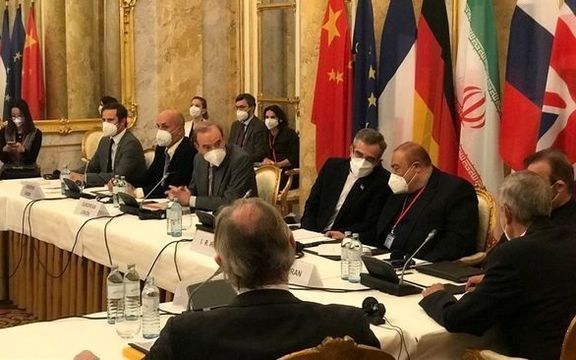
Talks over Iran’s atomic program in Vienna seem likely to continue beyond Friday as United States and Iranian negotiators tackle European proposals to bridge gaps.
Iran’s chief negotiator Ali Bagheri Kani met Friday with Enrique Mora, the European Union official acting as a go-between with a US team led by special envoy Rob Malley, and with Wang Kun, China’s ambassador to the International Atomic Energy Agency (IAEA). Iran has refused to meet the American face-to-face.
EU officials have argued that a text circulated by EU foreign policy chief Josep Borrell in late July should be a basis for the US and Iran to revive the 2015 Iran nuclear deal, the JCPOA (Joint Comprehensive Plan of Action), which the US left in 2018 prompting Iran after 2019 to expand its nuclear program beyond JCPOA limits.
But the Europeans have also highlighted remaining challenges, including intricate links between ‘technical’ and political issues, the question of which US sanctions introduced after 2018 contravene the deal, and Tehran’s demand for guarantees over access to world markets if the JCPOA is revived.
A senior European official told journalists late Thursday that among “four or five” issues still under dispute by the US and Iran was Tehran’s progress in uranium enrichment. Complicating technical issues in returning Iran’s nuclear program to JCPOA limits, Tehran has not only employed advanced centrifuges barred under the JCPOA but acquired knowledge and expertise in their use – including when enriching to 60 percent purity, far above the 3.67 percent JCPOA cap, and close to the 90 percent considered ‘weapons grade.’
‘Tattered allegations’
Another niggling issue is questions raised by the IAEA over Iran’s pre-2003 nuclear work. It has been widely reported Iranian negotiators have argued in Vienna any probe be shelved. Israeli journalist Barak Ravid tweeted he had been told by European officials that Iran was making “unrealistic demands” outside the scope of the JCPOA.
In an interview with Iran’s Arabic-language TV station al-Alam published Friday, Mohammad Eslami, head of the Atomic Energy Organization of Iran, said that agreement could be reached in Vienna if “the West…abandon their false excuses…tattered allegations and alleged documents…”
The IAEA in a 2015 report Final Assessment on Past and Present Outstanding Issues regarding Iran’s Nuclear Program found that weapons-linked work done by Iran before 2003 “did not advance beyond feasibility and scientific studies.” But in 2018 Israeli prime minister Benjamin Netanyahu claimed on the basis of documents allegedly removed by Israel from Iran that the pre-2003 work had been more advanced that the IAEA realized.
The agency has lacked access to the documents. But after agency inspectors found uranium traces at sites linked to the pre-2003 work and IAEA director-general Rafael Mariano Grossi deemed Iran’s answers unsatisfactory, the agency’s board in June censured Iran with a resolution raised by France, Germany, the United Kingdom, and the United States.
Red lines and consultations
Speaking in Cambodia, Russia’s Foreign Minister Sergei Lavrov said Tehran was “absolutely legitimate” in demanding a restoration “without exceptions” of the JCPOA as signed in 2015 and then approved by the United Nations Security Council. Lavrov suggested the US was now trying to amend the agreement.
Iran International’s correspondent in Vienna, Ahmad Samadi reported that Lavrov’s words have had a negative impact on the atmosphere in Vienna.
Iran’s foreign minister Hossein Amir-Abdollahian said Friday in Tehran that Iran sought “economic benefit from the deal, observing the country’s red lines, and preserving our indigenous nuclear capacity.”
While the current Vienna talks, which began Thursday, have been widely called “last ditch,” and while Borrell argued in a Financial Times piece published July 26 that “the space for additional significant compromises has been exhausted,” previous rounds in the Austrian capital – which began April 2021 and paused March 2022 – have ended with negotiators returning to their capitals for further consultations.
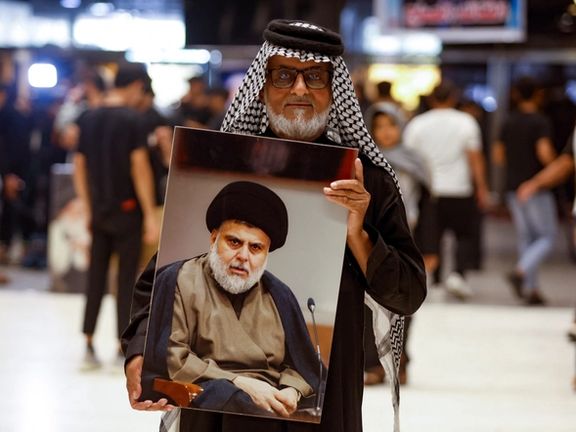
Thousands of protesters from Iraq's southern provinces have entered Baghdad's Green Zone again, chanting slogans against Iran’s interference in Iraq’s internal affairs.
This is the second mass congregation for Friday prayer by supporters of influential Shiite cleric Muqtada al-Sadr -- who seeks to curb the influence of the Islamic Republic of Iran in Iraqi politics. The protests are a show of force by the firebrand cleric whose party won the highest number of seats in the October 2021 elections but withdrew after failing to form a government with Sunni and Kurdish allies in Iraq's hectic power-sharing system.
Iran-backed parties have dominated many state institutions for years.
Protesting against corruption and political mismanagement, hundreds of followers of Sadr occupied the country's parliament on Saturday, July 30, after mounting concrete barricades on roads leading to Baghdad’s Green Zone, which houses government buildings and foreign embassies.
The protesters stressed the need for an independent government in Baghdad, emphasizing that they do not want an Iranian-linked government or a subordinate one. They especially rejected a Tehran-backed prime ministerial nominee. On Monday, July 25, the Coordination Framework -- a coalition of Shiite parties close to Tehran -- nominated Mohammed al-Sudani as the prime minister, a decision opposed by Sadr.
According to Iran International correspondent in Baghdad Truske Sadeghi, Sadr also held a meeting with Jeanine Hennis-Plasschaert, the special representative of the Secretary-General for the United Nations Assistance Mission for Iraq, to break the months-long deadlock.
Sadr, reportedly, has also agreed to meet with Hadi al-Amiri, the head of a Shiite political party and military organization close to Tehran and the de facto leader of Iran-backed Shiite militia Hashd al-Shaabi, to talk about an early election in the country.

The former head of Iran’s Revolutionary Guard intelligence, who was replaced in June has re-emerged with bluster, saying Israel “will not see its 80th anniversary.”
Hossein Ta’eb, the long-time head of IRGC Intelligence Organization was suddenly removed from his post on June 23 after a series of mysterious and well-planned sabotage and assassination operations in Iran blamed by officials on Israel. A series of other personnel changes followed, signaling the weakening of IRGC-IO and the possible strengthening of the Intelligence Ministry.
Fars news website affiliated with IRGC reported Thursday that Ta’eb gave a speech to a group of Revolutionary Guard political commissars, with a sweeping analysis of regional and world politics.
US President Joe Biden, Ta’eb said, wants to drag Iran into nuclear talks to get concessions and “again control the region, because this is the only way in which they can ensure the security of the Zionist regime and get hold of cheap oil.”
The statement reveals the conviction of Islamic Republic’s hardliners that they have seriously dented US power and influence in the Middle East, by supporting a large web of militant, anti-West proxy forces. They fear that the nuclear talks might eventually expand to include other demands by Washington and its allies, including a drastic change in Iran’s malign behavior.
Ta’eb’s well-publicized speech, besides re-habilitating his image, coincided with the resumption of negotiations in Vienna on Thursday aimed at concluding 16-month-long negotiations to revive the 2015 nuclear agreement, the JCPOA.
The United States insists that a reasonable offer was made to Iran in December 2021 to resolve the nuclear issue, but Tehran has been dragging its feet and making “extraneous” demands. Many observers have increasingly voiced concern that the Islamic Republic is delaying an agreement to gain time for the further expansion of its nuclear program, which is “fast galloping forward,” according to the head of the International Atomic Energy Agency, Rafael Grossi.
Ta’eb also strongly backed the favorite foreign policy theme of Supreme Leader Ali Khamenei to draw closer to Russian and China. He insisted that if the US and Europe guarantee the Islamic Republic’s interests and security, “we are in it”, but if “China and Russia can guarantee these two, we will accept it,” and this would not contradict the regime’s original dictum of “Neither West nor East”, he said.
Insisting that Israel suffers from deep internal divisions, Ta’eb said that the demise of the Jewish state is near, and it will not see its 80th anniversary. But he admitted that Israel began “a secret war against us,” which “we responded to.”
The former all-powerful intelligence chief, who is now an advisor to the IRGC chief commander, did not speak about his removal, which is widely attributed to repeated intelligence failures in preventing acts of sabotage.
Ta’eb’s speech also once again revealed the strategy of the Islamic Republic to blame internal problems and contradictions on “the enemy”, which usually means the United States, Israel and the West in general. The former intelligence chief reiterated the recent arguments of other hardliners that the resistance of many Iranian women to forced hijab is a campaign orchestrated by foreign enemies.
“The final aim of the enemy is to sow doubt in our trenches. We have to be mindful to respond to questions raised within our ranks, because not to respond to doubts will make the enemy’s arguments superior to ours…”
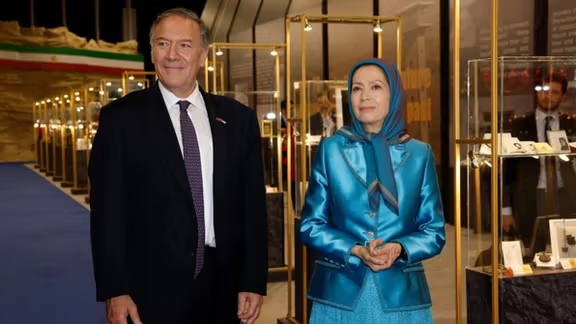
A leading US cybersecurity firm said Thursday a cyberattack that temporarily shut down numerous Albanian government digital services and websites in mid-July was done by Iran-backed hackers.
Cybersecurity firm Mandiant expressed “moderate confidence” the attackers were acting in support of Tehran’s efforts to disrupt a conference of the exiled Albania-based opposition group Mujahideen-e Khalq (MEK).
In its report, the company said that several factors reveal that the attack was carried out by pro-Iran hackers, including the timing, the content of a social media channel used to claim responsibility, and similarities in software code used with malware long used to target Farsi and Arabic speakers.
On July 18, Mandiant identified a new ransomware family dubbed ROADSWEEP, which drops a politically themed ransom note suggesting it targeted the Albanian government, and a group named “HomeLand Justice” claimed credit for the disruptive activity.
The “HomeLand Justice” posted a video of the ransomware being executed on its website and Telegram channel alongside documents purported to be Albanian residence permits of MEK members.
The July 23-24 conference by the dissident group, titled The Free Iran World Summit, was canceled following warnings from local authorities of a possible terrorist threat. The conference was scheduled to be held at Ashraf 3 camp in Manez -- 30 kilometers (19 miles) west of Albania’s capital, Tirana – where 3,000 MEK members live. Several US lawmakers were also among the invitees.
In July, Iran's Foreign Ministry sanctioned a group of US officials and lawmakers over their alleged support for the MEK group, that Tehran considers a terrorist organization.
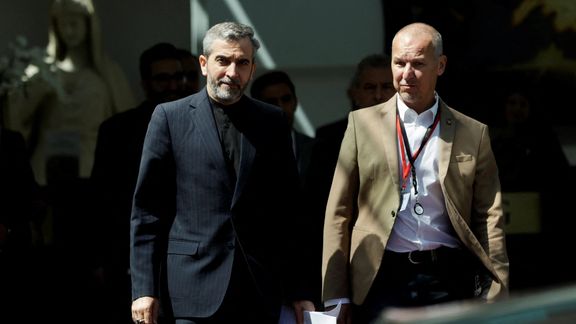
Talks over Iran’s nuclear program resumed in Vienna Thursday with Enrique Mora, the senior European official, set mediating between Iran and the United States.
The European Union has played an active role in continuing efforts to revive the 2015 Iran nuclear deal, the JCPOA (Joint Comprehensive Plan of Action) since year-long Vienna talks between Iran and six world powers paused in March. The new Vienna round appears to focus on a text produced in late July by EU foreign policy chief Joseph Borrell.
Mora Thursday met twice with Ali Bagheri Kani, the lead Iranian negotiator, according to a journalist at the Palais Coburg hotel and the official Iranian news agency IRNA, which also reported Mora met Rob Malley, the lead US negotiator.
IRNA quoted Bagheri Kani that Iran had presented “to the other sides our ideas, in terms of format and proposals, to make it possible to conclude the Vienna negotiations” and that he believed it possible “to bring the loose ends together in a short time if the other side is ready for a similar step.”
Thorny differences remain between Washington and Tehran. Speaking to al-Jazeera television Thursday, Mohammad Marandi, advisor-cum-spokesman for the Iranian negotiators, referring to the US leaving the JCPOA in 2018, said Washington had to give “the necessary assurances, so the Iranians are not fooled again.”
Marandi denied Iran had ever asked for guarantees over a future US presidency or that it had set as a precondition for JCPOA restoration the removal of Washington’s 2019 designation of Iran’s Revolutionary Guards (IRGC) as a ‘foreign terrorist organization.’
Marandi said Iran needed “assurances that the United States does not [again] violate the deal without paying a heavy price…” Asked if Americans would agree to this, the advisor replied: “That’s what they are going to be negotiating about.”
Reuters quoted an anonymous Iranian official that among Iran “own suggestions” raised in Vienna, apparently in addition to Borrell’s proposals, was “lifting sanctions on the Guards gradually.”
Step by step?
There has been speculation as to whether Borrell’s proposals might include a step-by-step approach to reviving the JCPOA, with sanctions lifted in stages as Iran stepped down its nuclear program, which has expanded since 2019 including enriching uranium to 60 percent and using advanced centrifuges barred under the deal.
Iran’s atomic chief Mohammad Eslami Thursday reiterated Tehran’s demand that the International Atomic Energy (IAEA) should accept Iran’s explanations over nuclear work before 2003, a demand that many reports have suggested Tehran sees as a precondition for restoring the JCPOA.
Emphasizing domestic pressure on President Joe Biden over his approach to Iran, Senator Bob Menendez, Democrat Chairman of the Senate Foreign Relations Committee, repeated his view that the JCPOA was dead.
Return to JCPOA ‘a fantasy’
“A return to the 2015 deal is not only unrealistic and unproductive, it is a fantasy,” Menendez said. “Iran is drawing out negotiations with delaying tactics and brinkmanship…It is time for us to send a message that we will do whatever is necessary to defend the national interest of the United States and to ensure than Iran never achieves a nuclear weapon.”
Menendez was addressing, virtually, the ‘International Convention for a Free Iran,’ which is sponsored by the Mujahideen-e Khalq, the Iranian opposition group once allied to Saddam Hussein and which Tehran regards as a ‘terrorist’ organization. Menendez praised Maryam Rajavi, the MEK co-leader, and condemned Iran’s “push towards a nuclear weapon.”
A poll by Data For Progress published Wednesday found 42 percent of Americans likely to vote in November’s mid-term elections were “very concerned” or “somewhat concerned” over Iran “developing the ability to produce a nuclear weapon.” Seventy-eight percent favored using “all our best diplomatic tools to put an end to Iran’s nuclear weapons program,” with 12 percent favoring “war with Iran…to slow down its nuclear weapons development.”